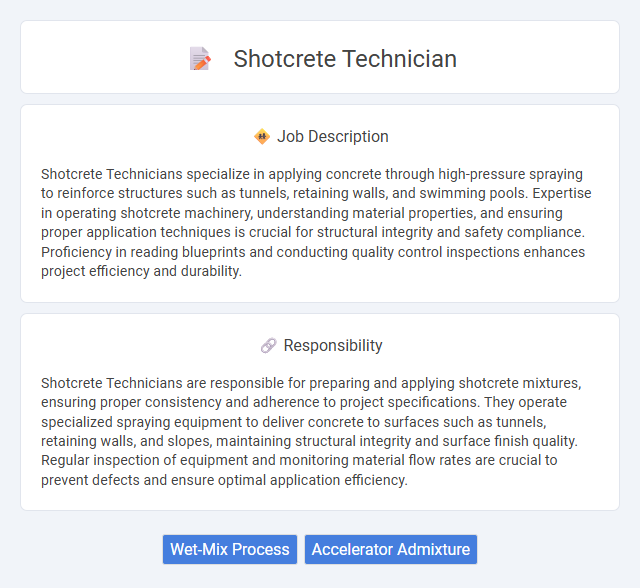
Shotcrete Technicians specialize in applying concrete through high-pressure spraying to reinforce structures such as tunnels, retaining walls, and swimming pools. Expertise in operating shotcrete machinery, understanding material properties, and ensuring proper application techniques is crucial for structural integrity and safety compliance. Proficiency in reading blueprints and conducting quality control inspections enhances project efficiency and durability.
Individuals with a strong physical stamina and an ability to work in challenging environments may be suitable for the role of a Shotcrete Technician, as the job often involves heavy lifting and exposure to outdoor or construction site conditions. Those who prefer routine desk jobs or have limited mobility might find it difficult to adapt to the physical demands and dynamic nature of this role. A high level of attention to detail and safety awareness will likely increase the probability of success in this profession.
Qualification
Shotcrete Technicians require extensive knowledge of concrete mixing, spraying equipment, and curing processes to ensure structural integrity and durability. Certification in shotcrete application, such as ACI Shotcrete Nozzleman or Technician credentials, is essential for validating skills and adherence to safety standards. Practical experience with different cementitious materials, nozzle control, and site safety protocols distinguishes proficient technicians in the construction industry.
Responsibility
Shotcrete Technicians are responsible for preparing and applying shotcrete mixtures, ensuring proper consistency and adherence to project specifications. They operate specialized spraying equipment to deliver concrete to surfaces such as tunnels, retaining walls, and slopes, maintaining structural integrity and surface finish quality. Regular inspection of equipment and monitoring material flow rates are crucial to prevent defects and ensure optimal application efficiency.
Benefit
Shotcrete Technicians likely benefit from competitive wages due to the specialized skills required for their role in construction and infrastructure projects. The job probably offers opportunities for hands-on experience with advanced concrete application techniques, enhancing career growth potential. Benefits may also include safety training and the chance to work in diverse environments, contributing to professional development.
Challenge
Shotcrete Technician roles likely involve navigating complex challenges related to maintaining consistent material mixtures and ensuring accurate, efficient application under varying environmental conditions. The probability of encountering technical difficulties such as nozzle clogging or uneven layering may require quick problem-solving skills and adaptability. Managing safety risks and adhering to project specifications are also expected challenges critical to successful job performance.
Career Advancement
Shotcrete Technicians gain specialized expertise in applying concrete through advanced spraying techniques, positioning themselves for roles such as crew supervisors or quality control inspectors. Mastery of equipment operation and safety protocols enhances opportunities in project management within construction and mining industries. Continuous certification and skills development lead to executive positions or consulting careers in structural repair and underground construction sectors.
Key Terms
Wet-Mix Process
Shotcrete Technicians specializing in the Wet-Mix Process operate advanced equipment to apply concrete mixtures efficiently for structural reinforcement and repair. Their expertise includes preparing the wet concrete mix, controlling nozzle pressure, and ensuring consistent application to optimize adhesion and durability. Mastery of wet-mix shotcrete techniques enhances construction quality in tunnels, bridges, and retaining walls.
Accelerator Admixture
Shotcrete Technicians specialize in the precise application of concrete sprayed at high velocity, utilizing accelerator admixtures to significantly reduce setting time and enhance early strength development. Mastery of accelerator admixture types, dosages, and compatibility with various cementitious materials is crucial for ensuring optimal performance and mitigating potential issues like rebound or excessive heat generation. Their expertise directly impacts structural integrity and efficiency in tunneling, mining, and construction projects requiring rapid concrete hardening.
 kuljobs.com
kuljobs.com